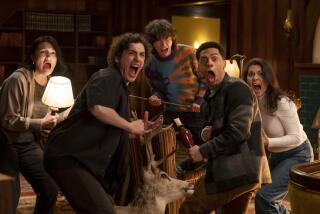Giving Kids Big ‘Goosebumps’
The term “goose bumps,” a.k.a. goose flesh, is defined in dictionaries as “a roughness of the skin produced by erection of its papillae, usually from cold or fear.”
And that’s exactly what “Goosebumps” delivers. Just as baby boomers couldn’t wait for the next eerie, spine-tingling installment of “The Twilight Zone” or “The Outer Limits,” today’s kids can’t get enough of the phenomenally successful Scholastic book series by R.L. Stine and its equally popular Fox TV adaptation.
During the past five years, Stine has written one “Goosebumps” book a month. “The Curse of Camp Cold Lake,” his 56th installment, was published this month. To date, an extraordinary 180 million “Goosebumps” novels have been sold, and Stine--dubbed the Stephen King for kids--was listed by USA Today as the nation’s best-selling author last year, with 18 titles in the Top 150 list.
The Fox series premiered in the fall of 1995, hit No. 1 in its first week and continues to occupy the top spot among all Saturday morning and weekday programs for children.
Deborah A. Forte, executive producer of the series for Scholastic Productions, says the reason kids love “Goosebumps” is the scare factor--mitigated by comic twists. “Unlike a lot of scary stories where they have adults and monsters,” she says, “this is about real kids who are very relatable to our audience. They are real kids in outlandish situations. It’s the combination of scare and humor that make them different than traditional scary stories.”
Case in point are Forte’s two favorite episodes. “The Cuckoo Clock of Doom” is a funny tale of a 12-year-old boy who wishes his obnoxious little sister had never been born. He gets his wish, thanks to a mysterious antique cuckoo clock. The equally inventive “Bad Hare Day” is about a stage-struck boy who wants to be part of a magic act so much that he’s even thrilled when an evil magician turns him into the rabbit-in-the-hat.
“Goosebumps” has spawned its own fan club, Web site, CD-ROM and videos, plus the usual array of towels, baseball caps and T-shirts. Negotiations are underway with 20th Century Fox about a feature film. And it makes its fifth appearance in prime time Sunday with an hourlong special, “Welcome to Dead House,” based on Stine’s first “Goosebumps” novel. A sixth special, “Night of the Living Dummy III,” airs July 20.
“Goosebumps” has defied the odds. Most TV adaptations of children’s book series have failed, such as ABC’s recent version of Judy Blume’s “Fudge” stories. On top of that, it’s an anthology, with different stories each week and no continuing characters--traditionally a tough sell in television.
Margaret Loesch, president of the Fox Children’s Network, says that those obstacles were acknowledged going in. “I said I believe the material transcends the problem,” she explains.
“Even though it’s an anthology, there is an attitude--a tongue-in-cheek sense of humor--that is pervasive through the material that I thought would work and would continue to bring in kids,” Loesch says.
Forte agrees. “I was very, very convinced this was the right way to go with these stories,” she says. “The shows would be able to stay fresh for a very long time as an anthology because children coming to this are seeing a new story unfold. People thought it was very risky. We decided to take the hard road, and it really paid off.”
Readership of Stine’s books, Loesch reports, has doubled since the series began. “I’ve gotten a lot of letters from teachers thanking us because it has really driven kids to read.”
“At Scholastic, we have gotten thousands of letters from parents,” Forte adds, “especially from parents of boys who say over and over again, ‘My son never liked to read for pleasure and then he began to read at his grade level. He loves to read for pleasure now.’ ”
The 30 episodes produced for the series so far have been based on Stine’s books, although not every thriller lends itself to adaptation. “There are certain [Stine] stories we can do justice to and others that don’t work,” explains Forte. “The drama and the scope isn’t right for TV, or it is just too ambitious for a half-hour.”
The mixture will change in the season ahead, with 22 new episodes in the works. “Goosebumps” will be presenting an original three-part chiller written by executive story editors Billy Brown and Dan Angel, who won a Writers Guild of America Award for “Cuckoo Clock.” The new fall season will also feature adaptations of some of the “Goosebumps” short stories, and Stine will be providing some original stories that he will later turn into novels.
Brown and Angel say they usually modify Stine’s plots for the television version--with his approval. “For one thing, many of the books rely on an internal monologue,” says Brown, a former staff writer on “Saturday Night Live.”
“It seems like the books that work the best are the ones that have a visual element which can translate,” says Angel.
Surprisingly enough, “We don’t write for kids,” Brown says. “We generally try to creep ourselves out and satisfy ourselves.”
Despite all the praise the series has received, Loesch says there has been one downside to “Goosebumps.” Many teachers have asked the network to provide them with a list of which books have been adapted for television. It seems that some students have been trying to get away with writing book reports based on the TV version rather than the printed work. (Sorry, kids: Fox is helping the teachers out. Is that chilling enough to give you goose bumps?)
“Goosebumps” airs Saturdays at 9 a.m. on Fox. The “Goosebumps” special airs Sunday at 7 p.m. on Fox.
More to Read
Sign up for our Book Club newsletter
Get the latest news, events and more from the Los Angeles Times Book Club, and help us get L.A. reading and talking.
You may occasionally receive promotional content from the Los Angeles Times.






